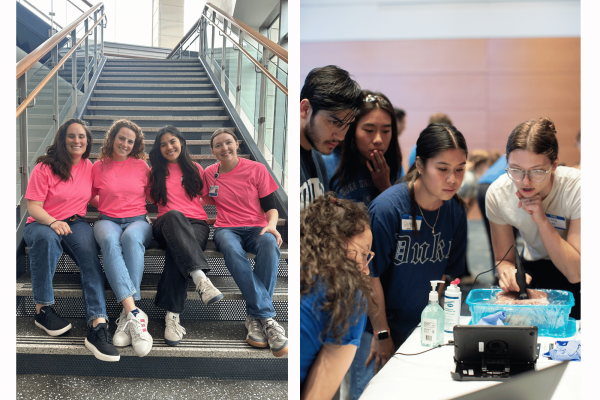
Earlier this month, students from the Duke PA Point-of-Care Ultrasound Society (POCUS) held their second annual NC Scan at the Duke Tent Semans Center for Health Education. DPAP faculty member and Professor Janelle Bludorn, MS, PA-C, considered this year’s event “wildly successful,” noting that more than 7 North Carolina universities participated and that well over 100 people attended.
To really appreciate how far this event has come, it's worth looking back at how it all started. The first official POCUS competition was launched last year by Class of 2024 students, Alex Filiput, Josh Sullivan, PJ Kambhiranond, and Jessie Michael. These students built on the foundation of the POCUS society, which was started by Class of 2023 students Katherine Bullock, Helen Gaynes, and Emily McEnerey. The society was created to help second-year students strengthen their teaching skills while providing POCUS education to first-year students.
This year, students from the Class of 2025 stepped up to lead the way. Julia Barrett, Megan Sippy, Tatiana Lim, and Madeline Quick carried the energy forward and made sure the event continued to grow.
“The first NC Scan, led by previous POCUS leadership, was a smaller but incredibly successful event, and we knew we had the chance to make it even bigger this year!” Lim exclaimed. The students aimed to encourage collaboration and expand access to POCUS education for PA students, medical students, and healthcare professionals across the state. By opening the competition to a wider audience, they created a valuable opportunity for shared learning and stronger connections between schools.
The turnout was a clear sign of growing interest across the state. In the end, there were 12 teams from 7 different schools, both PA and medical students.
Participating programs included:
-
Campbell PA Program
-
Campbell DO Program
-
East Carolina PA Program
-
Elon PA Program
-
Womack Fort Bragg PA Program
-
Wake Forest PA Program
-
Duke PA Program
-
Methodist University
To make the experience as hands-on and realistic as possible, the event featured a variety of stations set up around the room. Each one included questions designed to match the style and difficulty of the iScan competition at the AAPA conference. This challenged competitors to perform specific scans, identify relevant anatomy and pathology, and connect findings with clinical correlates.
To keep the NC Scan 2024 tradition going strong, Sippy expressed “We also brought back the “phone a friend” option, allowing participants to consult with a teammate if they did not know the answer to a question”. In addition to this, they included teaching points at certain stations, maintaining that while competition was encouraged, the main goal was to provide a space to have a good time while learning.

Looking back on the day, Lim said what stood out most was the sense of connection and shared purpose. “Seeing so many future healthcare professionals come together around a shared passion for POCUS was truly the highlight of it all”.
Bludorn praises the team, stating “The amount of planning, logistics, and expertise needed to pull this off was astonishing…making this successful event and all the work it took to make it happen worth celebrating.”
Behind the scenes, the team spent months meeting for nearly 2 hours each week to plan logistics and coordinate every detail. Sippy recalls, “We consistently delegated tasks amongst ourselves to ensure that everything could be completed in a timely manner given our busy clinical schedules…. To help ensure clarity and fairness, we even had some of our student facilitators run through the station questions in advance to ensure that they were clear, fair, and able to be completed within the 15 minutes allotted for each station.”
Barrett acknowledged the vital support that helped the event run smoothly. “NC Scan wouldn’t have been possible without our volunteer station facilitators. We are incredibly fortunate to have numerous POCUS experts from the area—along with three of our own Duke PA peers, Natalia Brennan, Katie Wierenga, and Jacqueline Foley – who brought excellent teaching skills and real-world experience to the event.”
POCUS continues to inspire students by showing the importance of connecting with peers beyond the classroom and building technical skills that boost confidence with ultrasound. Lim says, “It’s shown me how practical and powerful this tool can be in clinical practice. POCUS is fast, affordable, free of radiation, and highly versatile, especially for abdominal imaging, where it is often the preferred method for initial evaluation.”
